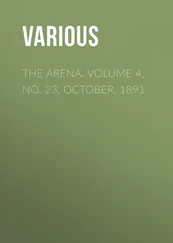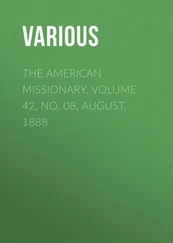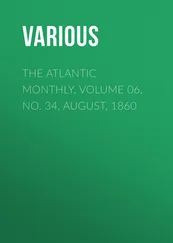Various - The Arena. Volume 4, No. 21, August, 1891
Здесь есть возможность читать онлайн «Various - The Arena. Volume 4, No. 21, August, 1891» — ознакомительный отрывок электронной книги совершенно бесплатно, а после прочтения отрывка купить полную версию. В некоторых случаях можно слушать аудио, скачать через торрент в формате fb2 и присутствует краткое содержание. Жанр: foreign_antique, periodic, foreign_edu, на английском языке. Описание произведения, (предисловие) а так же отзывы посетителей доступны на портале библиотеки ЛибКат.
- Название:The Arena. Volume 4, No. 21, August, 1891
- Автор:
- Жанр:
- Год:неизвестен
- ISBN:нет данных
- Рейтинг книги:4 / 5. Голосов: 1
-
Избранное:Добавить в избранное
- Отзывы:
-
Ваша оценка:
- 80
- 1
- 2
- 3
- 4
- 5
The Arena. Volume 4, No. 21, August, 1891: краткое содержание, описание и аннотация
Предлагаем к чтению аннотацию, описание, краткое содержание или предисловие (зависит от того, что написал сам автор книги «The Arena. Volume 4, No. 21, August, 1891»). Если вы не нашли необходимую информацию о книге — напишите в комментариях, мы постараемся отыскать её.
The Arena. Volume 4, No. 21, August, 1891 — читать онлайн ознакомительный отрывок
Ниже представлен текст книги, разбитый по страницам. Система сохранения места последней прочитанной страницы, позволяет с удобством читать онлайн бесплатно книгу «The Arena. Volume 4, No. 21, August, 1891», без необходимости каждый раз заново искать на чём Вы остановились. Поставьте закладку, и сможете в любой момент перейти на страницу, на которой закончили чтение.
Интервал:
Закладка:
Under corporate control, railways and their officials have taken possession of the majority of the mines which furnish the fuel so necessary to domestic and industrial life, and there are but few coalfields where they do not fix the price at which so essential an article shall be sold, and the whole nation is thus forced to pay undue tribute.
Controlling rates and the distribution of cars, railway officials have driven nearly all the mine owners who have not railways or railway officials for partners, to the wall. For instance, in Eastern Kansas, on the line of the St. Louis & San Francisco Railway Company, were two coal companies, whose plants were of about equal capacity, and several individual shippers. The railway company and its officials became interested in one of the coal companies, and such company was, by the rebate and other processes, given rates which averaged but forty per cent. of the rates charged other shippers, the result being that all the other shippers were driven out of the business, a part of them being hopelessly ruined before giving up the struggle. In addition to gross discriminations in rates this railway company practised worse discriminations in the distribution of cars; for instance, during one period of five hundred and sixty-four days, as was proven in court, they delivered to the Pittsburg Coal Company, 2,371 empty cars to be loaded with coal, although such company had sale for, and capacity to produce and load, during the same period, more than 15,000 cars. During the same time this railway company delivered to the Rogers Coal Company, in which the railway company and C. W. Rogers, its vice-president and general manager, were interested, no less than 15,483 coal cars, while four hundred and fifty-six were delivered to individual shippers. In other words, the coal company owned in large part by the railway and its officials was given eighty-two per cent. of all the facilities to get coal to market, although the other shippers had much greater combined capacity than had the Rogers Coal Company.
During the last four months of the period named, and when the Pittsburg Coal Company had the plant, force, and capacity to load thirty cars per day, they received an average of one and a fourth cars per day, resulting, as was intended, in the utter ruin of a prosperous business and the involuntary sale of the property, while the railway coal company, the railway officials, and the accommodating friends who operated the Rogers Coal Company, made vast sums of money; and when all other shippers had thus been driven off the line the price of coal was advanced to the consumer.
On another railway, traversing the same coal-field, the railway or its officials became interested in the Keith & Perry Coal Company—the largest coal company doing business on the line—and here the plan seems to have been, in addition to the manipulation of rates, to starve other mine operators out, and force them to sell their coal to the Keith & Perry Company, by failing to furnish the needed cars to those who did not sell their coal to the Keith & Perry Company at a very low price.
When the Keith & Perry Company had a great demand for coal, such parties as sold the product of their mines to that company were furnished with cars, but for the other operators cars were not to be had, such cars as were brought to the field being assigned to such parties as were loading to the Keith & Perry Company, because that company furnished the coal consumed by the locomotives of the railway.
One operator, after being for years forced in this way to sell his product to the Keith & Perry Company, or see his several plants stand idle, has, in recent months, been obliged to build some seven miles of railway in order to reach four different roads, and thus have a fighting chance for cars, although all these railways are provided with coal mines owned by the corporations or their officials.
In Arkansas, Jay Gould, or his railway company, own coal mines and the coal is transported to the neighboring town at low rates, and there is an ample supply of cars for such mines; but the owners of an adjoining mine are forced to haul their coal some eighteen miles to the same town in wagons, as the rates charged them over Mr. Gould’s railway are so high as to absorb the value of the coal at destination.
Not only are individuals thus oppressed, but for reasons which only the initiated can fathom there are seemingly purposeless discriminations against localities, as shown in the following extract from the Coal Trade Journal of March 25, 1891.
“Capt. Thomas H. Bates, before the railroad committee of the Colorado Senate, said: The Grand River Coal & Coke Company mine their coal in Garfield County, about fifty miles west of Leadville, and all they sell in Denver, Colorado Springs, and Pueblo, has to be hauled through Leadville. At Leadville the individual consumer has to pay $7.00 per ton for this coal, while in Denver, with an additional haul of 150 miles, the coal from the same mines is delivered to the individual consumer for $5.50 per ton. The Colorado Coal & Iron Company produce all the anthracite coal sold in Colorado. It is mined at Crested Butte, which is 150 miles nearer Leadville than Denver, yet this coal is sold in Leadville for $9.00 to the individual consumer, while the same coal is hauled 150 miles farther, and sold to the individual consumer for an advance of twenty-five cents per ton over the Leadville price, and is sold in Denver for $7.10 per ton in carload lots.”
With the government operating the railways, discriminations would cease, as would individual and local oppression; and we may be sure that an instant and absolute divorce would be decreed between railways and their officials on one side, and commercial enterprises of every name and kind on the other.
There are but three countries of any importance where the railways are operated by corporations permitted to fix rates, as in all others the government is the ultimate rate-making power: these are Great Britain, Canada, and the United States; and while the British government exercises a more effective control than we do, there are many and oppressive discriminations, and complaints are loud and frequent, and English farmers find it necessary to unite for the purpose of securing protection from corporate oppression, as is shown by the following from the Liverpool Courier of January 29, 1891.
After the counsel given them yesterday by Mr. A. B. Forwood, of Ormskirk, it may be expected that the Liverpool District Farmers’ Club will be on the watch for tangible evidence of their grievances against the railway companies…. Under certain circumstances competition operates to the advantage of the public, and rival carriers are constrained to convey goods from place to place at moderate charges; but where a company is not held in check, the tendency is for rates to advance. In many cases, too, special interests of the companies are promoted at the expense of localities, and even individuals are subjected to the wrong of preferential charges. (There are no complaints in Britain that these discriminations are practised for the purpose of enriching the officials.) Hence the necessity for the Railway Commission to regulate the magnates of the iron road, who when left without restraint pay little regard to interests other than those of their shareholders.
Although Mr. Acworth fails to mention this phase of English railway administration, it would appear that the evils of discrimination are common under corporate management in Great Britain, and that they are inherent to and inseparable from such management; and that the questions of rates, discriminations, and free traffic in fuel can be satisfactorily adjusted only by national ownership, and if for no other reasons such ownership is greatly to be desired.
Читать дальшеИнтервал:
Закладка:
Похожие книги на «The Arena. Volume 4, No. 21, August, 1891»
Представляем Вашему вниманию похожие книги на «The Arena. Volume 4, No. 21, August, 1891» списком для выбора. Мы отобрали схожую по названию и смыслу литературу в надежде предоставить читателям больше вариантов отыскать новые, интересные, ещё непрочитанные произведения.
Обсуждение, отзывы о книге «The Arena. Volume 4, No. 21, August, 1891» и просто собственные мнения читателей. Оставьте ваши комментарии, напишите, что Вы думаете о произведении, его смысле или главных героях. Укажите что конкретно понравилось, а что нет, и почему Вы так считаете.












